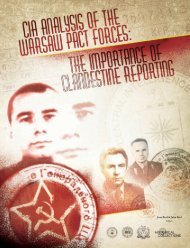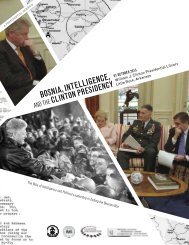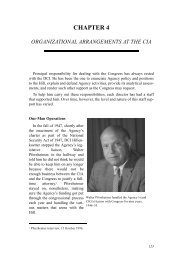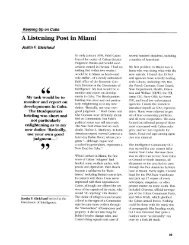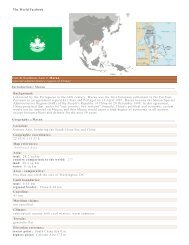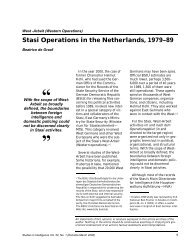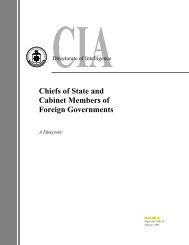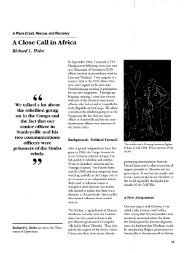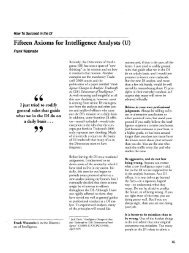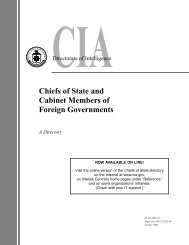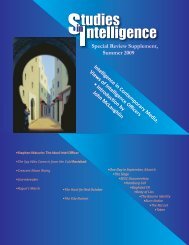A Look Over My Shoulder: A Life in the Central Intelligence Agency
A Look Over My Shoulder: A Life in the Central Intelligence Agency
A Look Over My Shoulder: A Life in the Central Intelligence Agency
Create successful ePaper yourself
Turn your PDF publications into a flip-book with our unique Google optimized e-Paper software.
<strong>Intelligence</strong> <strong>in</strong> Recent Public Literature<br />
A <strong>Look</strong> <strong>Over</strong> <strong>My</strong> <strong>Shoulder</strong>:<br />
A <strong>Life</strong> <strong>in</strong> <strong>the</strong> <strong>Central</strong> <strong>Intelligence</strong> <strong>Agency</strong><br />
Richard Helms, with William Hood. New York, NY: Random House, 2003. 452 pages.<br />
Reviewed by Thomas M. Troy, Jr.<br />
Dur<strong>in</strong>g his long career <strong>in</strong> <strong>in</strong>telligence, Richard Helms was no stranger to political<br />
and <strong>in</strong>telligence-related disputes. It is fitt<strong>in</strong>g, <strong>the</strong>refore, that he has left us a memoir<br />
that may only add to certa<strong>in</strong> controversies. A <strong>Look</strong> over <strong>My</strong> <strong>Shoulder</strong>, his<br />
posthumously published book, is always <strong>in</strong>terest<strong>in</strong>g and frequently provocative,<br />
and it probably will provide scores, if not hundreds, of <strong>in</strong>telligence mavens and<br />
graduate school students topics for essays, <strong>the</strong>ses, and dissertations. 1<br />
A <strong>Look</strong> over <strong>My</strong> <strong>Shoulder</strong> is def<strong>in</strong>itely not an exposé. Helms managed to write a<br />
452-page memoir without reveal<strong>in</strong>g anyth<strong>in</strong>g about <strong>in</strong>telligence operations or analyses<br />
that had not been declassified and previously released <strong>in</strong>to <strong>the</strong> public<br />
doma<strong>in</strong>. 2 Readers look<strong>in</strong>g for “now it can be told” tales of <strong>in</strong>telligence derr<strong>in</strong>g-do<br />
will have to look elsewhere. Readers seek<strong>in</strong>g to f<strong>in</strong>d out exactly why Mr. Helms<br />
succeeded <strong>in</strong> his career at <strong>the</strong> <strong>Central</strong> <strong>Intelligence</strong> <strong>Agency</strong> (CIA), ultimately serv<strong>in</strong>g<br />
as Director of <strong>Central</strong> <strong>Intelligence</strong> (DCI) from 1966-1973, will also have to look<br />
elsewhere. In ma<strong>in</strong>ta<strong>in</strong><strong>in</strong>g silence about operational matters, “The Man Who Kept<br />
<strong>the</strong> Secrets” 3 went to his death <strong>in</strong> 2002 leav<strong>in</strong>g his memoir but keep<strong>in</strong>g his version<br />
of “<strong>the</strong> faith.”<br />
Helms has left us <strong>in</strong> essence a summary of <strong>the</strong> Cold War up to <strong>the</strong> mid-1970s and a<br />
book of op<strong>in</strong>ions on selected topics—which, of course, is what a memoir is all about.<br />
He proves to be somewhat reticent about certa<strong>in</strong> issues—<strong>the</strong> Watergate cover-up,<br />
for example—and he occasionally contradicts himself, but he is not shy about<br />
express<strong>in</strong>g his op<strong>in</strong>ion concern<strong>in</strong>g some very important issues that he faced dur<strong>in</strong>g<br />
his long career. Helms also tells us what he thought about certa<strong>in</strong> people with<br />
whom he worked or served, and it seems to me that he used his memoir to pay<br />
back some people. Sometimes he is humorous, but o<strong>the</strong>r times he comes across as<br />
v<strong>in</strong>dictive and even petty <strong>in</strong> discuss<strong>in</strong>g former colleagues.<br />
1 For additional <strong>in</strong>formation on Helms’s life and career, see David Robarge, “In Memory and Appreciation:<br />
“Richard Helms—The <strong>Intelligence</strong> Professional Personified,” Studies <strong>in</strong> <strong>Intelligence</strong>, Vol. 46, No. 4, accessible<br />
at: http://www.ucia.gov/csi/publications.<br />
2 One possible exception: Mr. Helms makes it clear that <strong>the</strong> <strong>Central</strong> <strong>Intelligence</strong> <strong>Agency</strong> was deeply <strong>in</strong>volved<br />
<strong>in</strong> <strong>the</strong> coup <strong>in</strong> Iran <strong>in</strong> 1953, and to my knowledge <strong>the</strong> <strong>Agency</strong> has never officially acknowledged its<br />
<strong>in</strong>volvement.<br />
3 The title of a book about Mr. Helms and <strong>the</strong> CIA written by Thomas Powers and published <strong>in</strong> 1979.<br />
Thomas M. Troy, Jr., served <strong>in</strong> CIA’s Directorate of <strong>Intelligence</strong>.<br />
Studies <strong>in</strong> <strong>Intelligence</strong>, Vol. 48, No. 1 75
Book Reviews<br />
In this review, I concentrate on only three topics that Helms addresses: <strong>the</strong> Watergate<br />
scandal; <strong>the</strong> Nosenko affair; and <strong>the</strong> <strong>in</strong>fluence wielded at CIA by <strong>the</strong><br />
controversial James J. Angleton.<br />
Watergate<br />
A <strong>Look</strong> over <strong>My</strong> <strong>Shoulder</strong> beg<strong>in</strong>s with a brief discussion of one of <strong>the</strong> most controversial<br />
issues that Helms faced dur<strong>in</strong>g his tenure as DCI: <strong>the</strong> burglary at <strong>the</strong><br />
Watergate offices of <strong>the</strong> Democratic National Committee and subsequent cover up<br />
of <strong>the</strong> crime eng<strong>in</strong>eered by President Richard M. Nixon. It must have been very<br />
difficult for Helms even to th<strong>in</strong>k about this subject, and it is <strong>the</strong>refore not surpris<strong>in</strong>g<br />
that he is ambiguous <strong>in</strong> discuss<strong>in</strong>g it.<br />
Helms recounts <strong>the</strong> now-<strong>in</strong>famous meet<strong>in</strong>g at <strong>the</strong> White House on 23 June 1972,<br />
<strong>in</strong>volv<strong>in</strong>g himself, Gen. Vernon Walters (<strong>the</strong>n-Deputy Director of <strong>Central</strong> <strong>Intelligence</strong>),<br />
and Nixon’s closest aides, H. R. Haldeman and John Ehrlichman.<br />
Ehrlichman had summoned Helms and Walters, but Haldeman was <strong>the</strong> “heavy.”<br />
Helms quotes Haldeman, <strong>the</strong> White House Chief of Staff: “It has been decided”<br />
that Gen. Walters should go to <strong>the</strong> head of <strong>the</strong> Federal Bureau of Investigation<br />
(FBI) and tell him that “fur<strong>the</strong>r <strong>in</strong>vestigation <strong>in</strong> Mexico could lead to <strong>the</strong> exposure<br />
of certa<strong>in</strong> <strong>Agency</strong> assets and channels for handl<strong>in</strong>g money.” (The FBI was trac<strong>in</strong>g<br />
<strong>the</strong> money found with <strong>the</strong> Watergate burglars.) Helms says that he told Haldeman<br />
several times that <strong>the</strong> CIA was not <strong>in</strong>volved with <strong>the</strong> burglary or <strong>the</strong> burglars<br />
and had noth<strong>in</strong>g to fear about <strong>the</strong> FBI <strong>in</strong>vestigation, but Haldeman pressed on <strong>in</strong><br />
“an even more serious, ra<strong>the</strong>r threaten<strong>in</strong>g tone….” 4<br />
After that meet<strong>in</strong>g, Helms says, he “mentioned” to Walters that <strong>the</strong> CIA and <strong>the</strong><br />
FBI had an agreement about <strong>in</strong>telligence work abroad and that if ei<strong>the</strong>r agency<br />
found that l<strong>in</strong>es had crossed, <strong>the</strong> o<strong>the</strong>r party was to be <strong>in</strong>formed immediately. “I<br />
knew of no problem <strong>in</strong> Mexico. If <strong>the</strong> FBI sensed any conflict, it would be up to<br />
<strong>the</strong>m to <strong>in</strong>form us.” 5 Two pages later, Helms ambiguously writes that “Walters<br />
delivered <strong>the</strong> message (to <strong>the</strong> FBI) and for a while we thought <strong>the</strong> matter had been<br />
put to rest.” Readers who do not know much about <strong>the</strong> entire Watergate fiasco<br />
might ask which message did Walters deliver, <strong>the</strong> White House’s or <strong>the</strong> one from<br />
Helms.<br />
In fact, Walters delivered <strong>the</strong> White House message and <strong>the</strong> one from Helms.<br />
Accord<strong>in</strong>g to Walters, he told FBI director L. Patrick Gray that “while <strong>in</strong>vestigation<br />
of [<strong>the</strong> Watergate burglary] <strong>in</strong> Mexico had not yet touched <strong>Agency</strong> projects,<br />
cont<strong>in</strong>uation of it <strong>the</strong>re might expose some assets. I rem<strong>in</strong>ded him of <strong>the</strong> agreement<br />
between <strong>the</strong> two agencies, as Helms had suggested.” 6 To compound <strong>the</strong><br />
problem, a few days after Walters first saw <strong>the</strong> FBI about <strong>the</strong> matter, Mr. Helms<br />
wrote a memorandum that could be—and was—<strong>in</strong>terpreted as evidence that <strong>the</strong><br />
4 Helms, p. 9.<br />
5 Ibid., p. 10.<br />
6 Vernon Walters, Silent Missions (New York, NY: Doubleday, 1978), p. 589.<br />
76 Studies <strong>in</strong> <strong>Intelligence</strong>, Vol. 48, No. 1
CIA might actually have been <strong>in</strong>volved <strong>in</strong> <strong>the</strong> Watergate burglary and was<br />
attempt<strong>in</strong>g to formulate a cover story, or at <strong>the</strong> least was seek<strong>in</strong>g to stifle <strong>the</strong> FBI’s<br />
<strong>in</strong>vestigation. Helms wrote to Walters:<br />
We still adhere to <strong>the</strong> request that <strong>the</strong>y [<strong>the</strong> FBI] conf<strong>in</strong>e <strong>the</strong>mselves to <strong>the</strong> personalities<br />
already arrested or directly under suspicion and that <strong>the</strong>y desist<br />
from expand<strong>in</strong>g this <strong>in</strong>vestigation <strong>in</strong>to o<strong>the</strong>r areas which may well, eventually,<br />
run afoul of our operations. 7<br />
Thus, <strong>the</strong> sad fact is that Helms and Walters (and through <strong>the</strong>m, <strong>the</strong> CIA) did participate<br />
<strong>in</strong> <strong>the</strong> <strong>in</strong>itial stages of <strong>the</strong> Watergate cover-up. 8 Their participation was<br />
reluctant and presumably soul wrench<strong>in</strong>g, but <strong>the</strong>y did follow orders from <strong>the</strong><br />
White House.<br />
In his memoir, Helms recounts <strong>the</strong> next phase of this sordid tale. Presumably<br />
encouraged by <strong>the</strong>ir ability to enlist <strong>the</strong> leaders of <strong>the</strong> CIA, <strong>the</strong> White House staff<br />
asked <strong>the</strong> <strong>Agency</strong> to provide <strong>the</strong> funds to pay bail for <strong>the</strong> burglars! Helms is justifiably<br />
proud that he absolutely refused. Although he does not directly say so, it<br />
seems clear <strong>in</strong> retrospect that his refusal to provide fur<strong>the</strong>r aid to <strong>the</strong> White House<br />
and Nixon on Watergate meant that his days as DCI were numbered. About six<br />
months later, Nixon fired him.<br />
Helms returns to <strong>the</strong> Watergate scandal later <strong>in</strong> his memoir when he discusses <strong>the</strong><br />
dilemma he faced (and any DCI would face) when “a president orders his DCI to<br />
step out-of-bounds.” If a President’s directives cannot be deflected, Helms states,<br />
<strong>the</strong> DCI’s “responses range from acceptance to outright refusal and presumably<br />
resignation.” He <strong>the</strong>n says that when Nixon ordered his White House staff to<br />
“direct me (via Gen. Walters) to supply bail for <strong>the</strong> Watergate burglars and to<br />
deflect <strong>the</strong> FBI’s <strong>in</strong>vestigation of <strong>the</strong> crime, I <strong>in</strong>structed Walters to refuse <strong>the</strong>ir<br />
demands. Ra<strong>the</strong>r than force my resignation, and presumably face <strong>the</strong> likely<br />
<strong>in</strong>tense public curiosity about <strong>the</strong> reasons for my leav<strong>in</strong>g, President Nixon backed<br />
away.” 9 The quote unfortunately is a half-truth, and it raises <strong>the</strong> question: why did<br />
Helms not directly refuse <strong>the</strong> Nixon-Haldeman order of 23 June and force <strong>the</strong><br />
issue? One must reluctantly conclude that Helms made a major mistake dur<strong>in</strong>g<br />
<strong>the</strong> <strong>in</strong>itial stage of <strong>the</strong> Watergate scandal and that he has suffered a case of “selective<br />
memory” <strong>in</strong> his memoir.<br />
It seems to me somewhat tragic that even after 30 years Helms did not grasp <strong>the</strong> real<br />
mean<strong>in</strong>g for <strong>the</strong> CIA of Watergate and <strong>the</strong> <strong>Agency</strong>’s <strong>in</strong>volvement <strong>in</strong> <strong>the</strong> attempted<br />
cover-up. Several times <strong>in</strong> A <strong>Look</strong> over <strong>My</strong> <strong>Shoulder</strong>, he compla<strong>in</strong>s (sometimes with<br />
7 Emphasis added. The memorandum was dated 28 June 1972. It is part of <strong>the</strong> record of <strong>the</strong> hear<strong>in</strong>gs<br />
conducted by <strong>the</strong> US House of Representatives’ Judiciary Committee that was consider<strong>in</strong>g <strong>the</strong> impeachment<br />
of President Nixon. The memorandum is quoted <strong>in</strong> Fred Emery, Watergate (New York, NY: Random<br />
House Times Books, 1994), p. 193.<br />
8 Ibid., pp.190-95. See also Thomas Powers, The Man Who Kept <strong>the</strong> Secrets (New York, NY: Alfred A.<br />
Knopf, 1979), pp. 261-62.<br />
9 Helms, pp. 282-83.<br />
Book Reviews<br />
Studies <strong>in</strong> <strong>Intelligence</strong>, Vol. 48, No. 1 77
Book Reviews<br />
justification) about how US Representatives and Senators “showboated” to boost <strong>the</strong>ir<br />
political careers or (gasp!) asked embarrass<strong>in</strong>g questions about <strong>in</strong>telligence matters<br />
when <strong>the</strong>y were not members of <strong>the</strong> “appropriate” Congressional committees. I<br />
believe Thomas Powers was absolutely correct <strong>in</strong> his analysis of <strong>the</strong> significance of<br />
<strong>the</strong> CIA’s unfortunate and reluctant <strong>in</strong>volvement <strong>in</strong> <strong>the</strong> Watergate scandal. Writ<strong>in</strong>g<br />
<strong>in</strong> 1979, he said that Watergate “marks a violent break <strong>in</strong> <strong>Agency</strong> history, <strong>the</strong> first<br />
step <strong>in</strong> a process of exposure which has pretty much destroyed <strong>the</strong> unwritten charter<br />
established by Allen Dulles.” Watergate “underm<strong>in</strong>ed <strong>the</strong> consensus of trust <strong>in</strong> Wash<strong>in</strong>gton<br />
which was a truer source of <strong>the</strong> <strong>Agency</strong>’s strength than its legal charter….”<br />
And Watergate “ended <strong>the</strong> long congressional acquiescence to <strong>the</strong> special <strong>in</strong>timacy<br />
between <strong>the</strong> CIA and <strong>the</strong> Presidency, an <strong>in</strong>timacy which allowed Presidents to use<br />
CIA as <strong>the</strong>y might, beholden to no one so long as congressional oversight rema<strong>in</strong>ed a<br />
k<strong>in</strong>d of charade. Watergate, <strong>in</strong> short, made <strong>the</strong> CIA fair game.” 10 Powers cont<strong>in</strong>ues<br />
his analysis by say<strong>in</strong>g that Helms tried to avoid <strong>the</strong> Watergate affair like cholera and<br />
to protect <strong>the</strong> CIA, and he po<strong>in</strong>ts out that <strong>the</strong> only known victim of Watergate at <strong>the</strong><br />
CIA was Helms himself. I would suspect that Helms shared Powers’s op<strong>in</strong>ions, even<br />
though he avoids <strong>the</strong> issue of Watergate’s significance for <strong>the</strong> CIA <strong>in</strong> his memoir.<br />
The Nosenko Affair<br />
Helms devotes seven pages <strong>in</strong> his memoir to <strong>the</strong> <strong>in</strong>famous case of Soviet <strong>in</strong>telligence<br />
officer and defector Yuri Nosenko. 11 He calls <strong>the</strong> Nosenko case “<strong>the</strong> most<br />
frustrat<strong>in</strong>g operation <strong>in</strong> my experience,” and says that it plagued him as Deputy<br />
Director for Plans (DDP) and through most of his time as DCI. Although he<br />
acknowledges that “no case was more baffl<strong>in</strong>g,” his memoir only adds to <strong>the</strong> confusion<br />
about Nosenko—mak<strong>in</strong>g no reference, for example, to Anatoli Golitsy, an<br />
highly <strong>in</strong>fluential defector who called Nosenko’s credentials <strong>in</strong>to question. Helms<br />
also plays down <strong>the</strong> role assumed <strong>in</strong> <strong>the</strong> case by James J. Angleton, <strong>the</strong> chief of<br />
<strong>the</strong> Counter<strong>in</strong>telligence Staff. In addition, it appears that nei<strong>the</strong>r Helms, nor his<br />
collaborator, William Hood, nor any o<strong>the</strong>r researcher consulted two books by<br />
former officers of <strong>the</strong> Soviet <strong>in</strong>telligence service (KGB) that seem<strong>in</strong>gly provide<br />
ample proof that Nosenko was a bona fide defector. 12<br />
Nosenko was a mid-level KGB officer who, while serv<strong>in</strong>g temporarily <strong>in</strong> Geneva <strong>in</strong><br />
1962, volunteered to work for <strong>the</strong> CIA as an agent <strong>in</strong> place. Accord<strong>in</strong>g to Helms,<br />
Nosenko named one American communications clerk whom <strong>the</strong> KGB had recruited<br />
and p<strong>in</strong>po<strong>in</strong>ted <strong>the</strong> location of some 50 audio devices <strong>the</strong> KGB had planted <strong>in</strong> <strong>the</strong><br />
US embassy <strong>in</strong> Moscow. Before he returned to Moscow, Nosenko specified that no<br />
attempt be made to contact him while he was <strong>in</strong> <strong>the</strong> USSR, that he did not want to<br />
defect, and that he would contact <strong>the</strong> CIA <strong>the</strong> next time he was abroad.<br />
10 Powers, p. 258.<br />
11 The short chapter is titled “A Bone <strong>in</strong> <strong>the</strong> Throat,” an expression that Helms used to describe <strong>the</strong> Nosenko<br />
case when he testified on <strong>the</strong> Hill <strong>in</strong> 1978. US House of Representatives, Hear<strong>in</strong>gs, Select Committee<br />
on Assass<strong>in</strong>ations, Investigation of <strong>the</strong> Assass<strong>in</strong>ation of President John F. Kennedy (Wash<strong>in</strong>gton: US Government<br />
Pr<strong>in</strong>t<strong>in</strong>g Office, 1979), Volume IV, page 96. Hereafter I will cite this 12-volume publication as:<br />
Hear<strong>in</strong>gs, Select Committee on Assass<strong>in</strong>ation.<br />
12 The former KGB officers are Oleg Kalug<strong>in</strong> and Vasili Mitrokh<strong>in</strong>.<br />
78 Studies <strong>in</strong> <strong>Intelligence</strong>, Vol. 48, No. 1
Helms says: “Even before <strong>the</strong> first rush of excitement subsided, doubts about<br />
Nosenko had developed.” Some of <strong>the</strong> defector’s <strong>in</strong>formation duplicated data supplied<br />
by “ano<strong>the</strong>r KGB defector six months before Nosenko volunteered his services.”<br />
In addition, “doubts about Nosenko’s alleged career pattern and background flared.” 13<br />
For reasons only he knew, Helms fails to mention <strong>the</strong> name of <strong>the</strong> earlier KGB defector.<br />
That person was Anatoli Golitsyn, characterized by a British writer as “one of<br />
<strong>the</strong> most <strong>in</strong>trigu<strong>in</strong>g, troublesome and, ultimately, <strong>the</strong> most damag<strong>in</strong>g of packages<br />
ever to change hands <strong>in</strong> <strong>the</strong> East-West espionage game.” 14<br />
Lead<strong>in</strong>g <strong>the</strong> doubters <strong>in</strong> <strong>the</strong> CIA about Nosenko were Angleton, case officer Tennett<br />
“Pete” Bagley, David Murphy, <strong>the</strong> chief of <strong>the</strong> Soviet Division, and, one<br />
assumes, Helms.<br />
Angleton doubted Nosenko because he believed Golitsyn, who had conv<strong>in</strong>ced<br />
him that he was an important defector and a veritable font of wisdom. He told<br />
Angleton that <strong>the</strong> KGB had a “mole” <strong>in</strong>side <strong>the</strong> CIA. Golitsyn “predicted” that<br />
<strong>the</strong> KGB would attempt to discredit him by send<strong>in</strong>g false defectors who would<br />
deny and contradict what Golitsyn said and spread confusion and dissension<br />
with<strong>in</strong> <strong>the</strong> CIA and o<strong>the</strong>r Western <strong>in</strong>telligence services. When Nosenko could<br />
not confirm Golitsyn’s allegation about a “mole” and some o<strong>the</strong>r <strong>in</strong>formation,<br />
Angleton evidently accepted Golitsyn’s warn<strong>in</strong>g and concluded that Nosenko<br />
was a KGB “plant.” 15<br />
“Pete” Bagley was one of <strong>the</strong> case officers who first met with Nosenko <strong>in</strong><br />
Geneva. He later became chief of <strong>the</strong> counter<strong>in</strong>telligence branch and <strong>the</strong>n<br />
deputy division chief <strong>in</strong> <strong>the</strong> Soviet Division. He admitted that <strong>the</strong> material<br />
from Golitsyn that Angelton showed him was what first caused his suspicions<br />
about Nosenko. Bagley’s conviction that Nosenko was a KGB “plant” persisted<br />
at least through <strong>the</strong> early 1990s. 16<br />
Toge<strong>the</strong>r, Angleton and Bagley presumably conv<strong>in</strong>ced Murphy and Helms that<br />
Nosenko was “dirty.”<br />
Had Nosenko rema<strong>in</strong>ed <strong>in</strong> <strong>the</strong> Soviet Union and dropped off <strong>the</strong> CIA’s scope, not<br />
much would have happened. After 19 months <strong>in</strong> Moscow, however, Nosenko<br />
returned to Geneva <strong>in</strong> January of 1964, asked to defect, and dropped a bombshell:<br />
He claimed that he had reviewed <strong>the</strong> entire KGB file on Lee Harvey Oswald, <strong>the</strong><br />
alleged lone assass<strong>in</strong> of President John F. Kennedy. Nosenko said that <strong>the</strong> KGB<br />
had found Oswald to be unstable and had decl<strong>in</strong>ed to have anyth<strong>in</strong>g to do with<br />
him. Helms po<strong>in</strong>ts out that, <strong>the</strong> suspicions of some with<strong>in</strong> <strong>the</strong> CIA about Nosenko<br />
notwithstand<strong>in</strong>g, <strong>the</strong> <strong>Agency</strong> had no choice but to hustle Nosenko to Wash<strong>in</strong>gton<br />
for extensive debrief<strong>in</strong>g.<br />
13 Helms, pp. 239-40.<br />
14 Gordon Brook-Shepherd, The Storm Birds: Soviet Postwar Defectors (New York, NY: Henry Holt and<br />
Company, 1989), p. 198.<br />
15 David Wise, Molehunt (New York, NY: Random House, 1992), especially, pp. 65-80, 130-56. See also<br />
Tom Mangold, Cold Warrior (New York, NY: Simon & Schuster, 1991). Mangold is especially effective <strong>in</strong><br />
devastat<strong>in</strong>g Golitsyn and Angleton.<br />
16 Wise, p. 142.<br />
Book Reviews<br />
Studies <strong>in</strong> <strong>Intelligence</strong>, Vol. 48, No. 1 79
Book Reviews<br />
Helms states that <strong>the</strong> CIA officers scrut<strong>in</strong>iz<strong>in</strong>g Nosenko could not reach a consensus<br />
as to <strong>the</strong> truth of his claims. “The counter<strong>in</strong>telligence specialists and some experienced<br />
operatives considered him to have been programmed to mislead us. O<strong>the</strong>rs<br />
tended to believe Nosenko….” 17 Then-DDP Helms first told <strong>the</strong> Warren Commission<br />
(established to <strong>in</strong>vestigate <strong>the</strong> assass<strong>in</strong>ation of President Kennedy) that <strong>the</strong> <strong>Agency</strong><br />
could not establish Nosenko’s bona fides and warned <strong>the</strong> Commission not to use his<br />
<strong>in</strong>formation. The CIA proceeded to submit Nosenko to a “hostile <strong>in</strong>terrogation.”<br />
At first, Nosenko was held <strong>in</strong> a 10-foot by 10-foot attic <strong>in</strong> a CIA safe house <strong>in</strong> <strong>the</strong><br />
Wash<strong>in</strong>gton area. Then <strong>the</strong> CIA moved him to a specially constructed build<strong>in</strong>g at<br />
a tra<strong>in</strong><strong>in</strong>g site, where he was kept <strong>in</strong> solitary conf<strong>in</strong>ement and submitted to more<br />
<strong>in</strong>terrogation. Helms po<strong>in</strong>ts out that <strong>the</strong> office recommend<strong>in</strong>g that Nosenko be<br />
conf<strong>in</strong>ed was <strong>the</strong> Soviet Division of <strong>the</strong> DDP. What Helms does not say <strong>in</strong> his<br />
memoir is that he approved both <strong>the</strong> hostile <strong>in</strong>terrogation and <strong>the</strong> solitary conf<strong>in</strong>ement.<br />
He did somewhat reluctantly admit that he approved <strong>the</strong> decisions when he<br />
testified before <strong>the</strong> House Select Committee <strong>in</strong> 1978. 18<br />
Helms claims that Angleton “disagreed with <strong>the</strong> hostile <strong>in</strong>terrogation and conf<strong>in</strong>ement<br />
of Nosenko. From <strong>the</strong> early months, Angleton’s recommendation was that<br />
Nosenko be released, and his fur<strong>the</strong>r activity monitored.” 19 “Pete” Bagley disputes<br />
Helms concern<strong>in</strong>g Angleton’s role <strong>in</strong> this matter. 20 But what Helms says makes<br />
sense. S<strong>in</strong>ce Angleton believed Nosenko was a KGB plant, he presumably reasoned<br />
that it was a waste of time, effort, and money to <strong>in</strong>terrogate him.<br />
Accord<strong>in</strong>g to Helms, conditions <strong>in</strong> <strong>the</strong> build<strong>in</strong>g hous<strong>in</strong>g Nosenko were “spartan,<br />
verg<strong>in</strong>g on harsh, but no more so than solitary conf<strong>in</strong>ement <strong>in</strong> a maximum security<br />
federal prison.” One wonders about Helms’s knowledge of maximum security<br />
prisons. No matter <strong>the</strong> extent of his knowledge, his statement does little or noth<strong>in</strong>g<br />
to rebut <strong>the</strong> impression that <strong>the</strong> CIA basically abused Nosenko. When he<br />
testified <strong>in</strong> 1978, Helms was slightly more forthright; he said that <strong>the</strong> “fact that<br />
[Nosenko] may have been held too long was <strong>the</strong>refore deplorable, but never<strong>the</strong>less<br />
we were do<strong>in</strong>g our best.” 21<br />
Despite <strong>the</strong> solitary conf<strong>in</strong>ement and hostile <strong>in</strong>terrogation, Nosenko never changed<br />
his story that he was a KGB officer who truly defected. The debate with<strong>in</strong> <strong>the</strong> CIA<br />
about Nosenko raged for four years. Helms, who had become Deputy DCI, under<br />
DCI Adm. William Raborn, and <strong>the</strong>n DCI <strong>in</strong> 1966, f<strong>in</strong>ally tried to br<strong>in</strong>g a conclusion<br />
to <strong>the</strong> debate. In late 1967, he asked his deputy, Adm. Rufus Taylor, to make<br />
an <strong>in</strong>dependent study of <strong>the</strong> case.<br />
Taylor used <strong>the</strong> Office of Security to re-exam<strong>in</strong>e <strong>the</strong> entire matter. In October<br />
1968, he advised Helms that he was not conv<strong>in</strong>ced how <strong>the</strong> KGB would have bene-<br />
17 Helms, p. 242.<br />
18 Hear<strong>in</strong>gs, Select Committee on Assass<strong>in</strong>ations, Vol. XII, p. 531.<br />
19 Helms, p. 244.<br />
20 Wise, p. 143. See also Bagley’s testimony before <strong>the</strong> House Select Committee. Bagley was identified as<br />
“Mr. D. C.” Hear<strong>in</strong>gs, House Select Committee on Assass<strong>in</strong>ations, Vol. XII, pp. 573-644.<br />
21 Hear<strong>in</strong>gs, House Select Committee on Assass<strong>in</strong>ations, Vol. IV, p. 31.<br />
80 Studies <strong>in</strong> <strong>Intelligence</strong>, Vol. 48, No. 1
fited by send<strong>in</strong>g Nosenko as a false defector. Taylor recommended that Nosenko be<br />
accepted as a legitimate defector and that <strong>the</strong> CIA “rehabilitate,” release, and<br />
resettle him. Accord<strong>in</strong>g to Helms, doubts rema<strong>in</strong>ed “as strong as ever <strong>in</strong> some<br />
quarters….” Those “quarters” were <strong>in</strong> <strong>the</strong> Counter<strong>in</strong>telligence Staff, whose “representatives”<br />
cont<strong>in</strong>ued to question whe<strong>the</strong>r Nosenko’s au<strong>the</strong>nticity had been<br />
conclusively proven. O<strong>the</strong>r senior officers, however, believed that Nosenko should<br />
be accepted and that he had important services to offer <strong>the</strong> CIA and should be<br />
reta<strong>in</strong>ed under <strong>Agency</strong> contract. Helms agreed. In time, Nosenko received American<br />
citizenship, assumed a new identity, married, and pursued a new career <strong>in</strong> <strong>the</strong><br />
United States. 22<br />
All’s well that ends well? Not always. Helms was obviously reluctant to discuss<br />
<strong>the</strong> Nosenko case, for he omitted <strong>the</strong> essential parts—Golitsyn’s allegations and<br />
Angleton’s acceptance of those allegations. He also makes no mention of Angleton<br />
(and Bagley) us<strong>in</strong>g Golitsyn to provide questions to be put to Nosenko and to check<br />
on Nosenko’s answers—to act, <strong>in</strong> effect, as a counsel to <strong>the</strong> prosecution. 23<br />
In 1978, Helms ra<strong>the</strong>r testily told <strong>the</strong> House Select Committee that although he<br />
had decided 10 years previously to rehabilitate and resettle Nosenko (and give him<br />
a contract), he had never decided on Nosenko’s bona fides. 24 In 1989, Helms told<br />
author Tom Mangold that “I still haven’t <strong>the</strong> fa<strong>in</strong>test idea if Nosenko is bona<br />
fide.” 25 Perhaps Helms handles <strong>the</strong> Nosenko case as if it were a live hand grenade<br />
<strong>in</strong> A <strong>Look</strong> <strong>Over</strong> <strong>My</strong> <strong>Shoulder</strong> because until <strong>the</strong> day he died he still hadn’t decided.<br />
If so, one can only regret <strong>the</strong> <strong>in</strong>decision.<br />
It is understandable that Helms would not refer to <strong>the</strong> perhaps embarrass<strong>in</strong>g<br />
accounts of <strong>the</strong> Nosenko case written by David Wise and Tom Mangold. It is not<br />
understandable why Helms and o<strong>the</strong>rs <strong>in</strong>volved <strong>in</strong> <strong>the</strong> preparation of A <strong>Look</strong> <strong>Over</strong><br />
<strong>My</strong> <strong>Shoulder</strong> did not refer to <strong>the</strong> books written by Oleg Kalug<strong>in</strong> and Vasili<br />
Mitrokh<strong>in</strong>.<br />
In 1994, Kalug<strong>in</strong>’s memoir of his 32-year service <strong>in</strong> <strong>the</strong> KGB was published as The<br />
First Directorate. Kalug<strong>in</strong> discusses Nosenko briefly several times. He states<br />
clearly that he and <strong>the</strong> KGB considered Nosenko to be a true defector. 26 He writes<br />
that while he was serv<strong>in</strong>g <strong>in</strong> Wash<strong>in</strong>gton <strong>in</strong> <strong>the</strong> late-1960s and early-1970s <strong>the</strong><br />
KGB received an order to “carry out <strong>the</strong> death sentence that Nosenko had received<br />
from a Soviet court.” This “wet job” was never fulfilled because <strong>the</strong> KGB could not<br />
f<strong>in</strong>d Nosenko. He notes that KGB chief Yuri Andropov was still talk<strong>in</strong>g about<br />
assass<strong>in</strong>at<strong>in</strong>g Nosenko years later. 27<br />
22 Helms, p. 244.<br />
23 See <strong>the</strong> testimony by John Hart, Hear<strong>in</strong>gs, Select Committee on Assass<strong>in</strong>ation, Vol. II, pp. 494-95. Hart<br />
had been directed by <strong>the</strong>n-DCI Stansfield Turner to review <strong>the</strong> Nosenko case <strong>in</strong> 1977. Bagley also testified<br />
that Golitsyn submitted questions for and comments about Nosenko, and that <strong>the</strong> CIA used Golitsyn<br />
to check on Nosenko’s statements. Ibid., Vol. XII, pp. 577-78.<br />
24 Ibid., Vol. IV, p. 34.<br />
25 Mangold, p. 160.<br />
26 Oleg Kalug<strong>in</strong>, The First Directorate (New York, NY: St. Mart<strong>in</strong>’s Press, 1994), pp. 59-60.<br />
27 Ibid., pp. 93-94, 239.<br />
Book Reviews<br />
Studies <strong>in</strong> <strong>Intelligence</strong>, Vol. 48, No. 1 81
Book Reviews<br />
In 1999, Vasili Mitrokh<strong>in</strong>, greatly aided by British scholar Christopher Andrew,<br />
produced The Sword and <strong>the</strong> Shield: The Mitrokh<strong>in</strong> Archive and <strong>the</strong> Secret History<br />
of <strong>the</strong> KGB. 28 Mitrokh<strong>in</strong>, who had worked <strong>in</strong> <strong>the</strong> First Chief Directorate of <strong>the</strong><br />
KGB until 1984, defected to <strong>the</strong> British <strong>in</strong> 1992. He brought with him thousands<br />
of documents and notes. Some of <strong>the</strong>se concerned Nosenko, <strong>in</strong>clud<strong>in</strong>g a psychological<br />
profile prepared by <strong>the</strong> KGB that “expla<strong>in</strong>ed” why Nosenko defected: Nosenko<br />
“lusted for power,” it said, and suffered from “careerism.” 29 Ano<strong>the</strong>r document<br />
<strong>in</strong>dicated that <strong>the</strong> KGB planned to have an “illegal” assass<strong>in</strong>ate Nosenko if <strong>the</strong> latter<br />
visited <strong>the</strong> World Fair <strong>in</strong> Montreal <strong>in</strong> 1967. 30<br />
Oleg Gordievsky, ano<strong>the</strong>r prom<strong>in</strong>ent agent-<strong>in</strong>-place for <strong>the</strong> British who later<br />
defected from <strong>the</strong> KGB, has also stated that Nosenko was truly a defector. 31<br />
Perhaps Kalug<strong>in</strong>, Mitrokh<strong>in</strong>, and Gordievsky are <strong>in</strong>volved <strong>in</strong> a vast dis<strong>in</strong>formation<br />
campaign by <strong>the</strong> KGB and its successor organizations, but one wonders: to<br />
what end? If one accepts <strong>the</strong> <strong>in</strong>formation provided by <strong>the</strong>se three former KGB<br />
officers as true, <strong>the</strong>n <strong>the</strong> KGB considered Nosenko an important defector, a Soviet<br />
court sentenced him to death, and <strong>the</strong> KGB <strong>in</strong>structed its officers on several occasions<br />
to attempt to kill him. Doesn’t this establish Nosenko’s bona fides?<br />
James Angleton<br />
In a chapter entitled “Beyond X-2,” 32 Helms cont<strong>in</strong>ues his defense of James Angleton.<br />
One reason for his stand appears to be that “much of what has been<br />
published is unfair to Angleton, to <strong>the</strong> various DCI’s for whom he worked, to <strong>the</strong><br />
<strong>Agency</strong>, and to history.” 33 Helms obviously took criticism of Angleton personally—<br />
as well he should have, s<strong>in</strong>ce Helms was Angleton’s most important patron and<br />
boss. Ano<strong>the</strong>r reason for <strong>the</strong> apologia—and here one must just accept Helms’s<br />
word—is that for many years Angleton did perform very well: first, with <strong>the</strong> OSS,<br />
and later, with <strong>the</strong> CIA. A third and important reason is that Helms valued Angleton<br />
“as a colleague and a friend.” 34<br />
Helms acknowledges that one of Angleton’s “dom<strong>in</strong>ant traits was an obsessive<br />
approach to th<strong>in</strong>gs that <strong>in</strong>terested him,” and that “Jim went overboard from time<br />
to time.” 35 As an example of “go<strong>in</strong>g overboard,” Helms cites Angelton’s unique<br />
view, ma<strong>in</strong>ta<strong>in</strong>ed for years, that <strong>the</strong> S<strong>in</strong>o-Soviet split was a mirage created by<br />
Soviet experts through deception and dis<strong>in</strong>formation. Helms evidently thought<br />
this was an example of boys just be<strong>in</strong>g boys: “I let him push this view and<br />
28 Christopher Andrew and Vasili Mitrokh<strong>in</strong>, The Sword and <strong>the</strong> Shield (New York: Basic Books, 1999)<br />
29 Ibid., p. 186, and footnote 58 on p. 609.<br />
30 Ibid., p. 368, and footnote 66 on p. 631. Golitsyn was also to be assass<strong>in</strong>ated.<br />
31 Mangold, p. 204.<br />
32 The Office of Strategic Services (OSS) designated its counter<strong>in</strong>telligence units as “X-2.” Both Helms<br />
and Angleton served with dist<strong>in</strong>ction <strong>in</strong> <strong>the</strong> OSS.<br />
33 Helms, p. 274. Emphasis added.<br />
34 Ibid., p. 276.<br />
35 Ibid., p. 277.<br />
82 Studies <strong>in</strong> <strong>Intelligence</strong>, Vol. 48, No. 1
arranged for him to express it to experts, <strong>in</strong>clud<strong>in</strong>g Henry Kiss<strong>in</strong>ger.” When<br />
Angleton could not f<strong>in</strong>d anybody else to support his view, Helms “<strong>in</strong>structed him to<br />
knock it off….” What Helms does not say is that Golitsyn also peddled this view of<br />
a “phony” S<strong>in</strong>o-Soviet split and ei<strong>the</strong>r <strong>in</strong>spired or re<strong>in</strong>forced Angleton’s view.<br />
Helms also does not mention that Angleton—supported by Helms—was mak<strong>in</strong>g<br />
life more difficult than it had to be for <strong>the</strong> CIA’s analysts who were attempt<strong>in</strong>g to<br />
conv<strong>in</strong>ce skeptics that <strong>the</strong>re <strong>in</strong>deed was a S<strong>in</strong>o-Soviet split. 36 F<strong>in</strong>ally, Helms does<br />
not admit that Angleton never did “knock it off;” Angleton ma<strong>in</strong>ta<strong>in</strong>ed his <strong>the</strong>sis<br />
until <strong>the</strong> day he died.<br />
Helms also absolves Angleton from any responsibility for <strong>the</strong> MHCHAOS operation<br />
<strong>in</strong> <strong>the</strong> late-1960s and early-1970s, which was designed to discover whe<strong>the</strong>r<br />
foreign governments had <strong>in</strong>stigated or were <strong>in</strong>volved <strong>in</strong> foment<strong>in</strong>g <strong>the</strong> political<br />
unrest <strong>in</strong> <strong>the</strong> United States, especially <strong>the</strong> anti-Vietnam War protests. Helms says<br />
that <strong>the</strong> unit that ran <strong>the</strong> MHCHAOS operation was a mere “appendage” of Angleton’s<br />
Counter<strong>in</strong>telligence Staff and that <strong>the</strong> unit reported to him directly and not<br />
through Angleton. O<strong>the</strong>r authors dispute Helms’s version and claim that Angleton<br />
played a major role <strong>in</strong> <strong>the</strong> operation. 37<br />
Whatever <strong>the</strong> truth, Helms takes responsibility for MHCHAOS’s excesses. He<br />
admits <strong>in</strong> someth<strong>in</strong>g of an “accidents will happen” fashion that <strong>the</strong> <strong>Agency</strong> violated<br />
its charter by <strong>in</strong>filtrat<strong>in</strong>g and report<strong>in</strong>g on <strong>the</strong> activity of groups of American<br />
citizens who were protest<strong>in</strong>g <strong>the</strong> policies of Presidents Lyndon Johnson and Richard<br />
Nixon. For Helms, it was <strong>the</strong> “devil made me do it.” He writes of <strong>the</strong> situation:<br />
“…without <strong>the</strong> President’s <strong>in</strong>sistence, CIA would never have <strong>in</strong>stigated or reported<br />
on anyth<strong>in</strong>g touch<strong>in</strong>g on domestic political violence.” 38 I th<strong>in</strong>k that this assessment<br />
accurately describes how Helms felt at <strong>the</strong> time: he was caught between a<br />
rock and ano<strong>the</strong>r rock. His account of this demoraliz<strong>in</strong>g episode aga<strong>in</strong> raises a<br />
question: Why did Helms not at least threaten to resign when President Johnson<br />
ordered him and <strong>the</strong> CIA to violate <strong>the</strong> <strong>Agency</strong>’s charter?<br />
Acknowledg<strong>in</strong>g that Angleton had his faults, Helms notes that his counter<strong>in</strong>telligence<br />
chief became “too isolated late <strong>in</strong> his career” and “overvalued some<br />
sources….” But he never mentions who <strong>the</strong>se “sources” were. Nor does he make<br />
<strong>the</strong> connection between Angleton’s faults and <strong>the</strong> great “molehunt” that began <strong>in</strong><br />
1962 and lasted for years. In fact, Helms spends less than two pages <strong>in</strong> describ<strong>in</strong>g<br />
this shatter<strong>in</strong>g episode—<strong>the</strong> most dishearten<strong>in</strong>g and dismay<strong>in</strong>g pages <strong>in</strong> his entire<br />
book. 39<br />
In what one can only consider a masterpiece of obfuscation, Helms writes of Angleton’s<br />
“alleged role <strong>in</strong> ru<strong>in</strong><strong>in</strong>g <strong>the</strong> careers of various <strong>Agency</strong> officers with unfounded<br />
36 The skeptics did not necessarily accept <strong>the</strong> Golitsyn-Angleton <strong>the</strong>sis; <strong>the</strong>y admitted that <strong>the</strong> Soviets<br />
and <strong>the</strong> Ch<strong>in</strong>ese were hav<strong>in</strong>g problems, but <strong>the</strong>y did not agree with <strong>the</strong> notion that <strong>the</strong> two communist<br />
behemoths were fundamentally at odds with one ano<strong>the</strong>r. See, for <strong>in</strong>stance, Harold Ford, “Call<strong>in</strong>g <strong>the</strong><br />
S<strong>in</strong>o-Soviet Split,” Studies In <strong>Intelligence</strong> (Unclassified Edition, W<strong>in</strong>ter 1998-99), pp. 57-71.<br />
37 See Wise and Mangold.<br />
38 Helms, p. 282.<br />
39 Ibid., pp. 283-84.<br />
Book Reviews<br />
Studies <strong>in</strong> <strong>Intelligence</strong>, Vol. 48, No. 1 83
Book Reviews<br />
suspicions of <strong>the</strong>ir loyalty.” To review briefly: Golitsyn conv<strong>in</strong>ced Angleton that <strong>the</strong><br />
KGB had penetrated <strong>the</strong> CIA and that <strong>the</strong>re was a “mole” whose real name began<br />
with a “K” and was Slavic <strong>in</strong> orig<strong>in</strong>. Angleton, who actually turned over to<br />
Golitsyn <strong>the</strong> personnel files of <strong>Agency</strong> staff employees, <strong>the</strong>n began a years-long<br />
process of f<strong>in</strong>d<strong>in</strong>g <strong>the</strong> “mole.” 40 Angleton could never prove that any of <strong>the</strong> people<br />
he considered to be <strong>the</strong> “mole” were <strong>in</strong> fact disloyal, but <strong>the</strong>ir careers were ru<strong>in</strong>ed.<br />
Helms obviously did not consider Angleton to be <strong>the</strong> root of <strong>the</strong> problem <strong>in</strong> <strong>the</strong><br />
1960s, and he evidently went to his death without chang<strong>in</strong>g his m<strong>in</strong>d. He writes of<br />
<strong>the</strong>se people with ru<strong>in</strong>ed careers:<br />
In <strong>the</strong> end, I had no choice but to accept a decision that said each was <strong>in</strong>nocent,<br />
but that <strong>the</strong> <strong>in</strong>nocence could not be proved. This is <strong>the</strong> reverse of <strong>the</strong><br />
verdict occasionally given <strong>in</strong> British law courts—“guilty but not proved.” 41<br />
Helms <strong>the</strong>n contradicts his previous statement about Angleton play<strong>in</strong>g an “alleged<br />
role” by writ<strong>in</strong>g that <strong>the</strong> Office of Security and <strong>the</strong> Counter<strong>in</strong>telligence Staff “collaborated<br />
closely,” with <strong>the</strong> CI Staff play<strong>in</strong>g an advisory role. He is honorable<br />
enough to acknowledge that <strong>the</strong> “f<strong>in</strong>al decision was m<strong>in</strong>e alone.”<br />
Cont<strong>in</strong>u<strong>in</strong>g his defense of Angleton, Helms denies “as patently false” <strong>the</strong> charge<br />
that Angleton’s suspicions brought <strong>the</strong> <strong>Agency</strong>’s Soviet operations to a halt <strong>in</strong> <strong>the</strong><br />
last few years of his career. Accord<strong>in</strong>g to Helms, defectors were accepted and new<br />
operations went forward. His m<strong>in</strong>imal account, however, so contradicts what<br />
many o<strong>the</strong>rs have stated and written that it begs for some proof. Unfortunately,<br />
Helms provides absolutely no details to substantiate his assertion. Helms admits,<br />
on page 284, that he should have <strong>in</strong>sisted that Angleton step aside. If only he had<br />
done so and spared <strong>the</strong> <strong>Agency</strong> one of its darkest times. The ironic and obviously<br />
un<strong>in</strong>tended result of <strong>the</strong> determ<strong>in</strong>ed defense of James Angleton is that Helms sullies<br />
his reputation.<br />
In Sum<br />
Some longtime public servants never write personal accounts of <strong>the</strong>ir careers, and<br />
one is left to wonder what <strong>the</strong>y really thought. O<strong>the</strong>rs write memoirs that are so<br />
bland that one wonders why <strong>the</strong>y bo<strong>the</strong>red. Richard Helms served <strong>in</strong> one of <strong>the</strong><br />
most important jobs <strong>in</strong> <strong>the</strong> US government dur<strong>in</strong>g one of <strong>the</strong> most controversial<br />
periods <strong>in</strong> US history. We are all fortunate that he left us a memoir that both<br />
enterta<strong>in</strong>s and stimulates. In a broad sense, A <strong>Look</strong> <strong>Over</strong> <strong>My</strong> <strong>Shoulder</strong> is also a<br />
type of morality play. Today’s <strong>in</strong>telligence professionals should read it and heed its<br />
lessons.<br />
40 See Wise and Mangold.<br />
41 Helms, p. 283. Emphasis added.<br />
84 Studies <strong>in</strong> <strong>Intelligence</strong>, Vol. 48, No. 1



